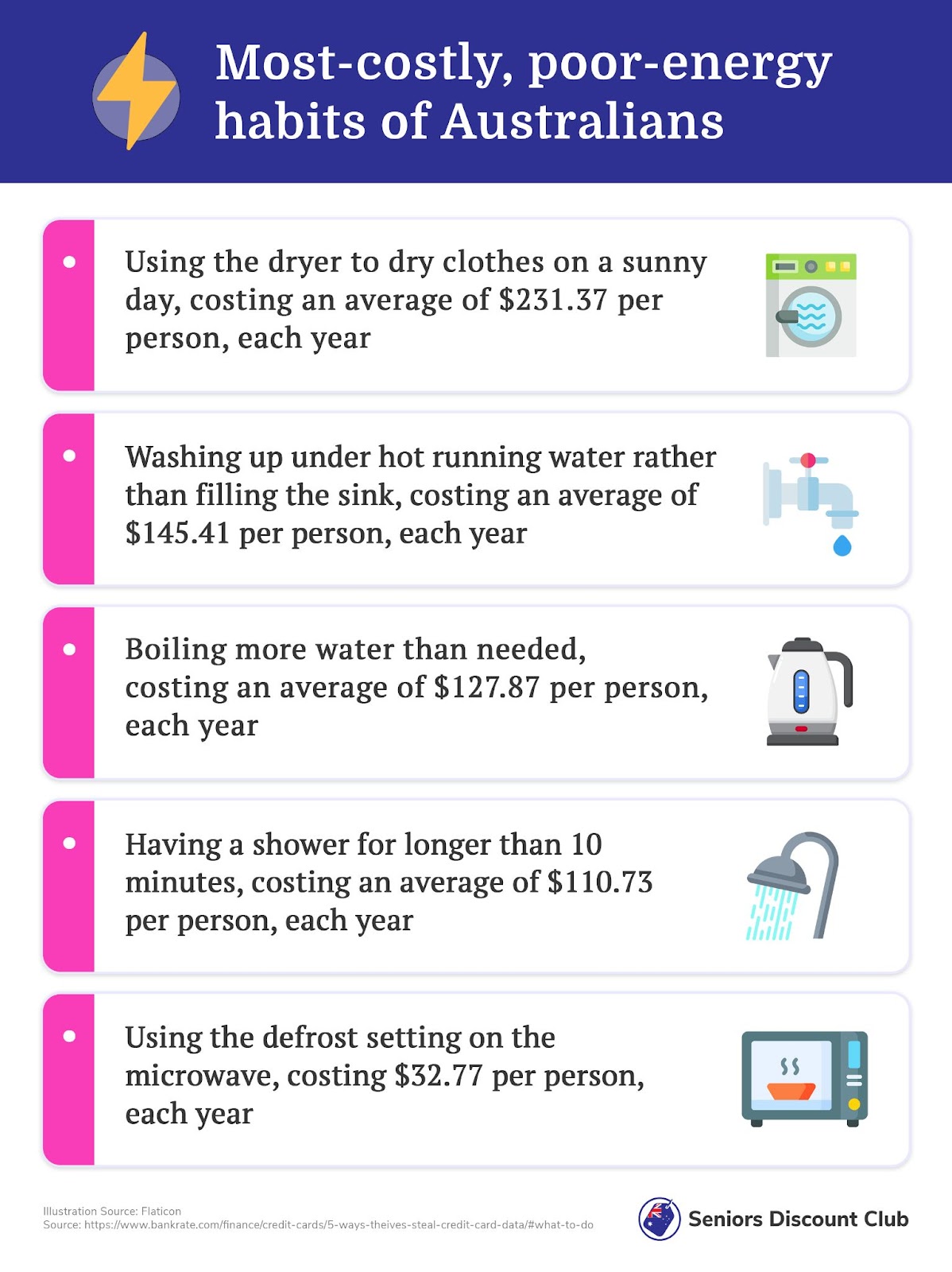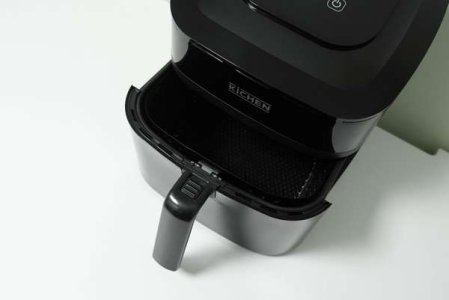Are your poor energy habits costing you an extra $670? Find out the simple tricks that could save your wallet from surging bills
By
VanessaC
- Replies 10
As quarter bills continue to rise, bill stress levels of Australians are at their highest in four years, and we might be the culprit of these sky-high bills.
New research from ING revealed the everyday energy habits of Australians are costing more than $15 billion annually. This includes doing laundry, taking hot showers, and even boiling more water than needed.
Matt Bowen, ING Australia’s Head of Daily Banking, said, 'It's clear from the research that poor-energy habits can really add up.'
So, what are these poor-energy habits you need to be aware of?

It might not seem like much at first. But these little costs all add up–not to mention its impact on the environment.
But can you really save money with small changes around the house?
Kellie from Melbourne cut her energy usage by 30 per cent with a few little tweaks–like watching TV by candlelight, unplugging her dryer when not needed, and continuously looking for the best energy deal.
'Once I was accountable for my own electricity usage and bills, I felt a level of responsibility to consider my usage and spend in relation to my personal financial goals,' she said.
Kellie’s not the only one jumping on forward-thinking solutions to drop costs–almost two million other Aussies have chosen to go back to the office instead of working from home to save money, and some 30 per cent have opted for an air fryer over the oven to save on costs.
Senior industry fellow at the Royal Melbourne Institute of Technology, Professor Alan Pears, confirmed that air fryers are twice more efficient than an oven. ‘A roast in the oven takes two or three hours, I can put a roast in the air fryer and it's done in an hour,’ Natasha Difegerico, a Queensland mum said.
Importance of Investing in Energy-Saving Appliances
Every appliance comes with two price tags: the purchase price and the operating cost. Over time, the latter can far outweigh the former. This is where energy-efficient appliances come into the mix. Though energy-saving appliances may have a higher upfront cost, they can save you dollars in the long run. They consume significantly less power while delivering the same performance and are environmentally friendly too!
Popular appliances with an energy-saving makeover include fridges, washing machines, dishwashers, and air conditioners. The star of the show? Undoubtedly, it's the LED Light bulb. These little champions use about one-fifth of the electricity that old-school incandescent bulbs do. They even last a whopping 25 times longer!
Then there's the modern version of the humble fridge. Today's energy-efficient fridges use 40% less power than similar models made ten years ago. They make up one of the most significant shares of our power bills, so every tiny saving here is a big win for your wallet.
We haven't forgotten about the laundry! Investing in an energy-star-rated washing machine may have a steep upfront cost, but constant use of these energy-saving machines will not cost as much and will save you dollars in the long run!
There are also water-efficient dishwashers that can save you a tidy sum on your water bill. Since old machines use up to 12 gallons per cycle, saving 3-5 gallons per wash can add up fast.
By investing wisely in these energy-saving appliances, you're not just shaving dollars off your monthly bills but also doing your part to save our environment.
Below are some more tips on how to save energy at home:

Do you have any further tips or advice on how to save energy? Let us know in the comments below!
New research from ING revealed the everyday energy habits of Australians are costing more than $15 billion annually. This includes doing laundry, taking hot showers, and even boiling more water than needed.
Matt Bowen, ING Australia’s Head of Daily Banking, said, 'It's clear from the research that poor-energy habits can really add up.'
So, what are these poor-energy habits you need to be aware of?
It might not seem like much at first. But these little costs all add up–not to mention its impact on the environment.
But can you really save money with small changes around the house?
Kellie from Melbourne cut her energy usage by 30 per cent with a few little tweaks–like watching TV by candlelight, unplugging her dryer when not needed, and continuously looking for the best energy deal.
'Once I was accountable for my own electricity usage and bills, I felt a level of responsibility to consider my usage and spend in relation to my personal financial goals,' she said.
Kellie’s not the only one jumping on forward-thinking solutions to drop costs–almost two million other Aussies have chosen to go back to the office instead of working from home to save money, and some 30 per cent have opted for an air fryer over the oven to save on costs.
Senior industry fellow at the Royal Melbourne Institute of Technology, Professor Alan Pears, confirmed that air fryers are twice more efficient than an oven. ‘A roast in the oven takes two or three hours, I can put a roast in the air fryer and it's done in an hour,’ Natasha Difegerico, a Queensland mum said.
Importance of Investing in Energy-Saving Appliances
Every appliance comes with two price tags: the purchase price and the operating cost. Over time, the latter can far outweigh the former. This is where energy-efficient appliances come into the mix. Though energy-saving appliances may have a higher upfront cost, they can save you dollars in the long run. They consume significantly less power while delivering the same performance and are environmentally friendly too!
Popular appliances with an energy-saving makeover include fridges, washing machines, dishwashers, and air conditioners. The star of the show? Undoubtedly, it's the LED Light bulb. These little champions use about one-fifth of the electricity that old-school incandescent bulbs do. They even last a whopping 25 times longer!
Then there's the modern version of the humble fridge. Today's energy-efficient fridges use 40% less power than similar models made ten years ago. They make up one of the most significant shares of our power bills, so every tiny saving here is a big win for your wallet.
We haven't forgotten about the laundry! Investing in an energy-star-rated washing machine may have a steep upfront cost, but constant use of these energy-saving machines will not cost as much and will save you dollars in the long run!
There are also water-efficient dishwashers that can save you a tidy sum on your water bill. Since old machines use up to 12 gallons per cycle, saving 3-5 gallons per wash can add up fast.
By investing wisely in these energy-saving appliances, you're not just shaving dollars off your monthly bills but also doing your part to save our environment.
Below are some more tips on how to save energy at home:
Key Takeaways
- Poor energy habits could be costing the average Australian up to $670 per year, according to new research from ING.
- The most costly energy habits include drying clothes in a dryer instead of in the sun, washing up under hot running water instead of filling the sink, boiling more water than needed, and taking hot showers for more than 10 minutes.
- One Australian, Kellie, has reduced her energy usage by 30 per cent by making small changes, such as unplugging her dryer and watching television by candlelight.
- Alan Pears from the Royal Melbourne Institute of Technology suggests that air fryers are approximately twice as efficient as an oven, which can result in lower energy bills.
Do you have any further tips or advice on how to save energy? Let us know in the comments below!









